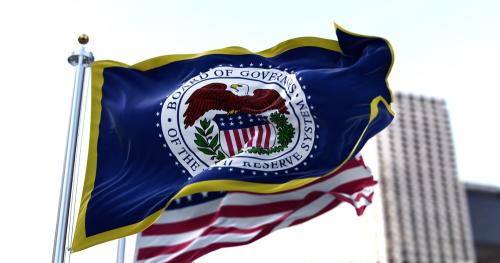Paul Tucker, drawing from his 33 years as a central banker, says that Congress should be much more specific about the objectives it wants the Federal Reserve to achieve and the Fed should try harder to explain what it’s doing.
In a new book, Unelected Power: The Quest for Legitimacy in Central Banking and the Regulatory State (Princeton University Press, 2018), Tucker, a former deputy governor of the Bank of England, seeks to establish why, when and how democratically elected legislatures should delegate authority to an independent agency, one free from the day-to-day influence of politicians.
Tucker recently stopped by Brookings, and sat down with me to answer a few questions. You can watch the interview here:
Noting that the independence of the Fed and other central banks is often questioned these days by both the left and the right, Tucker argues that independence remains critically important—both in monetary policy and in financial regulation—and deserves to be defended.
But for that independence to be legitimate in a democratic society, Tucker argues that elected representatives should delegate power in a limited and transparent way. Congress should give the Fed an objective that is “sufficiently clear” to be monitored in a straightforward manner, let the Fed pursue those objectives without political interference, and regard their congressional oversight as a way to decide whether the Fed is worthy of continued independence. Too often, he says, “the objective is left vague and then Congress feels compelled to get involved in more of the detail of how it’s done. That seems to me to be the wrong way around. Congress should make the big decisions.”
Tucker would prefer, for instance, elected politicians would decide what “price stability” means. This happens in the U.K, for instance, where the Treasury defines the term for the Bank of England, but not in the U.S. Since a change in U.S. law is unlikely, Tucker argues the Fed should have done more to explain the case for defining “price stability” as a 2 percent inflation target. “Chairman [Ben] Bernanke did exactly the right thing in getting the Fed to articulate how it was articulating its mandate…but it would have been even better had there been a healthy public debate about that…Understanding is an absolute precondition to legitimacy.”
The same principles hold for financial regulation, he says. Congress also should set clear objectives and then get out of the way: “Frame an objective for the lender of last resort. Determine how resilient you want the U.S. financial system as a whole to be. Stay out of the details.” The Fed, he adds, should be involved in financial regulation because it alone has the authority and the responsibility to lend to solvent banks that run short of liquidity. But, he adds, the Fed should not be the only arm of the government with a role in financial regulation because some regulatory policies, like those that can affect the distribution of income and the allocation of credit, are more appropriately made by the elected government.
Tucker also says the Fed “needs to get out around the country and explain what it’s doing, not just through business groups, but to groups of citizens.” The public, he argues, is unlikely to maintain confidence in a system it doesn’t understand. And without more public understanding, the Fed’s much-needed independence is at risk.




Commentary
A veteran central banker’s advice to Congress and the Fed on how best to preserve the Fed’s independence
May 9, 2018